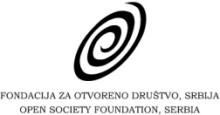08. 12. 2014
Public Lecture for Journalism Students

The lecturers were: professor Rade Veljanovski, whose lecture covered features of the Serbian media systems and key European standards; assistant professor Dejan Milenković, who spoke about the relation of Serbian media laws and European standards; attorney-at-law Slobodan Kremenjak, whose speech was about the implementation of media laws in practice and necessary changes for fulfilling European standards.
Serbian Media System and European Standards
Prof. Rade Veljanovski charaterized the Serbian media system after year 2000 as a media system in transition given that political changes in a society are also a basis for changes in the media system. The changes occur in a form of a democratic and professional transformation of media system, Veljanovski explained. Democratic transformation implies the role of the state in the institutional removal of all obstacles to free flow of information, opinions and views, in putting out of force undemocratic laws and creating laws according to democratic rules, he said.
Discontinuity with previous times cannot be made if we do not put out of force media laws that were in force during socialism and 1990s and if we do not create new laws that implement standards of the democratic world, said prof. Veljanovski. The European Union has a myriad of documents that determine the development of democratic media system and they contain regulatory basis for national legislations, he explained.
As for the standards of the European regulatory framework, the professor singled out as the most important one the separation of media system from the influence of government, politics and other power centers, that is creating an environment where editorial independence and independence of the media can exist as a precondition for a free and democratic public sphere. As for other standards, Veljanovski stated the following ones as very important: the establishment of media market (which Serbia did not have during socialism, while in the 1990s the market was very chaotic and unregulated); free establishment of print media without permits (unlike in the case of broadcast media); the establishment of an independent regulatory body for broadcasting; the establishment of radio and TV stations according to the law; the establishment of dual ownership model; the transformation of the state radio and television into public service broadcaster; the ownership transformation (privatization) of state-owned and socially-owned media; and respect of the entire set of human rights - not only the right to be informed and the right to freedom of speech, but other rights as well, because if human rights are not featured in the media, they will not be fulfilled in the best way, the professor concluded.
Professor Veljanovski then explained the development of media laws in Serbia since 2000. He said that the changes to regulation and the creation of new laws were at first primarily initiated by civil society, including media and journalists' associations. The first result of this initiative were the Law on Broadcasting from 2002 and the Law on Public Information from 2003. Veljanovski reminded the students that three new laws were adopted in August 2014: the Law on Public Information and Media, the Law on Electronic Media (that replaced the Law on Broadcasting) and the Law on Public Service Broadcasters.
At the end of his lecture, professor Veljanovski stated the most important features of the Serbian media system: the adoption of media laws that contain European principles, but also slow and inconsistent implementation of media laws; inconsistent changes to media laws and the creation of regulatory confusion; prolonged chaos in the broadcasting spectrum until 2006; the fact that media privatization has not been completed (we still have the problem of state ownership in the media although the laws from 2002 and 2003 already envisaged privatization, Veljanovski noted); slow establishment of the media market; slow transformation of the state radio-television into a public service broadcaster; uncertain future of many media, particularly media of national minorities; slowed down technological development (digital switchover was initially planned for 2012); political influence on the media is still visible; corruption in the media; the fact that the Media Strategy (of 2011) still keeps a set of issues open. As the last feature, Veljanovski stated his opinion that the latest media laws, adopted in 2014, are at the same time a step forward and a step backward for the media sphere.
Media Laws in Serbia and European Standards
What are European standards? Are these standards of the EU or the Council of Europe? Starting from these questions, assisstant professor Dejan Milenković explained important difference between the obligatory nature of the documents adopted by the EU and the Council of Europe. A significant share of European standards is contained in the Council of Europe documents, primarily in its resolutions and recommendations. These documents have moral importance, but are not obligatory for states, while directives and regulations of the EU are obligatory for member states, Milenković said.
The most important document of the Council of Europe pertaining to media systems is the Convention on Transfrontier Television, ratified by Serbia, which means that Serbia has to respect contractual obligations stemming from the Convention.
A document of the Council of Europe that is obligatory for the states that ratify it is the Europan Convention on Human Rights. It is important because it contains the list of the first generation of human rights, freedom of expression included, and a part of the Convention is dedicated to the mechanism important for the media sphere - transnational mechanism of the protection of freedom of expression personified in the European Court of Human Rights. The court has excellent case law pertaining to the Article 10 of the European Convention. Article 10 is the basis of media freedom, freedom of expression and public information, including a part of the case law pertaining to the media, Milenković explained.
As for the EU directives, standards they contain have to be adapted and transferred to the legislation of member countries and further elaborated. Directives, conventions and recommendations contain general views, that is principles that member countries elaborate within their legal systems based on the respective features of these legal systems, Milenković said.
The EU, primarily through its directives, as obligatory documents for its member states, created a part of standards pertaining to broadcast media, that is audio-visual content and audio-visual market, as the latter is one of the most important markets of the EU. Since Serbia is on the path to becoming a full member of the EU, it has began to implement standards stemming from the directive, Milenković explained.
When we launched the first media system reform in Serbia in the period 2000-2003, we took into account all the recommendations pertaining to the media and we tried to build the Law on Broadcast Media and the Law on Public Information on the basic principles contained in the recommendations, Milenković explained. European standards were built into our legal system with the laws from 2002 and 2003. The elaboration of these principles was fairly good, but the problem arose in the implementation of the laws, he said. For example, already in 2003 the Law on Public Information envisaged media privatization, but the privatization has not happened to this day. „The existence of good standards is not enough. It is necessary that the state is prepared to implement these standards fully, correctly and in the spirit of the law", Milenković concluded.
Implementation of Media Law in Practice and European Standards
Attorney-at-law Slobodan Kremenjak explained that Serbia aligns its legislation with the standards of the Council of Europe and the EU because this is envisaged by the Serbian Constitution and international treates signed by Serbia and ratified by its National Parliament. He also said that the Serbian Constitution directly refers to international standards of human rights - it is said in the Constitution that provisions on human rights in Serbia, including the right to freedom of expression, will be implemented in accordance with the international practice and will be interpreted and implemented in the manner they are interpreted and implemented by international bodies in charge of monitoring their implementation.
More precisely, regarding Article 10 of the European Convention on Human Rights - it is the European Court of Human Rights in Strasbourg and the case law of this court pertaining to the implementation of the Article 10 of the European Convention that is a part of standards that our Constitution obliges us to align with. However, this practice is rarely applied by Serbian courts. As for the Council of Europe, Serbia is its member, and it is recommended that it respects the standards defined by the Council of Europe documents, Kremenjak said. When it comes to standards, recently adopted media laws in Serbia are a step forward in harmonization with the European regulation, but it remains to be seen how the laws will be implemented in practice as it is not enough that laws are good - it is also important that they are properly implemented.
Practice is a bigger problem than regulation in Serbia, Kremenjak said and stated the following - for example, freedom of expression may be only exceptionally limited under the following conditions: if the law prescribes it, if it is with the aim of protecting a legitimate interest, and if it is truly necessary in a democratic society (the issue of proportionality). All the three conditions must be fulfilled. The biggest problem in practice is recognizing what is necessary in a democratic society regarding freedom of expression, and to ensure proportionality of possible limitations. Failure to implement the law (and its poor implementation) was one of the biggest problems with the old media laws - for example, media privatization has not been completed, the media did not have equal conditions in the market, there was no control of state aid, although this was prescribed or guaranteed by law. This significantly hampered the development of media sector because of the failure to create a functional, competitive market that would enable financial stability and independence of the media. Hence many problems in the media sector. The new laws prescribe clear rules regarding the right to competition and the control of the state aid, in accordance with European standards. Their consistent implementation can lead to the improvement of the situation in the media sector. Therefore, in order to fulfill European standards in the realm of freedom of expression, it is important not only to have good laws, but also to implement them and to do it properly, Kremenjak concluded.
Discussion
In the ensuing discussion, the experts answered students' questions pertaining to reporting on minors, withdrawal of the state from media ownership, censorship and self-censorship in the media.

The contents of this article are the sole responsibility of the authors and do not necessarily reflect the views of the Civil Rights Defenders.

The contents of this article are the sole responsibility of the authors and do not necessarily reflect the views of the Open Society Foundation, Serbia.
-
Photo: ANEM
-
Photo: ANEM
-
Photo: ANEM
-
Photo: ANEM
-
Photo: ANEM
-
Photo: ANEM
-
Photo: ANEM
-
Photo: ANEM
-
Photo: ANEM
-
Photo: ANEM
-
No comments on this topic.





